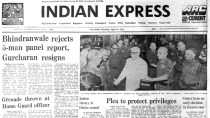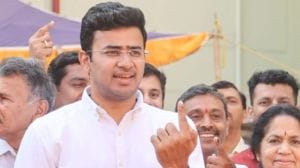- India
- International
No Proof Required: Conflict of interest, anyone?
High time the PM asked all BJP politicians to give their LPG cylinder, sorry, BCCI job, back.
 In 2011, Ajay Maken decided to introduce a draft National Sports Development Bill to bring the BCCI under the RTI. (Illustration: C R Sasikumar)
In 2011, Ajay Maken decided to introduce a draft National Sports Development Bill to bring the BCCI under the RTI. (Illustration: C R Sasikumar)Conflict of interest is now a household phrase. Mainstream media (MSM) and the Congress party are the flag-bearers of this newfound morality in public life. The Congress criticises and MSM (particularly English TV) hyperventilates and endorses. The main theme of this Congress monologue is that the BJP is just as corrupt as they were (they certainly don’t deny that they were very corrupt!). As proof, evidence is provided about conflict of interest “relationship” of two BJP leaders — Foreign Minister Sushma Swaraj and Rajasthan Chief Minister Vasundhara Raje — with a former BCCI official, Lalit Modi.
As readers of this column know, politicians of both major parties, the Congress and the BJP, have had a long-term cosy club (the CC in BCCI) relationship with the BCCI. I have always believed that invoking the BCCI in your morality defence is a stupid, self-defeating strategy. It is bound to backfire. And the Congress is using this conflict of interest as the prime reason to try to hold up Parliament and prevent discussion of crucial in-the-interest-of-the-nation bills.
[related-post]
A pot should not call a kettle black (what is the politically correct phrase in these challenged times?) and people in glass houses should not throw stones. But no point in telling the Congress that. In 2011, the UPA’s sports minister, Ajay Maken, decided to introduce a draft National Sports Development Bill. The bill would have brought the BCCI and all other sports bodies under the Right to Information Act. All of us would support such an effort, no? After all, on what grounds can the BCCI possibly not come under the RTI?
The draft bill was vetoed by the UPA cabinet comprising of four UPA cricket ministers, who (apparently) did not have any conflict of interest: Sharad Pawar (ICC president), Farooq Abdullah (J&K Cricket Association president), C.P. Joshi (chief of Rajasthan Cricket Association), and Vilasrao Deshmukh (head of Mumbai Cricket Association). It gets worse (could it?) — Kapil Sibal deemed it fit to remain in the cabinet discussions and vehemently opposed the bill. And, of course, the UPA allowed him to do so.
No conflict of interest resignations were demanded or offered. Interestingly, the only person who thought it fit to talk about the impropriety was J&K chief minister, Omar Abdullah, son of Farooq Abdullah, who tweeted, “I believe the Union ministers heading sports bodies should have excused themselves from the sports bill discussion”. Given the UPA regime’s spotless record, it is not surprising that Omar was unceremoniously made to eat his words — the tweet has since been deleted.

The UPA non-conflict of interest story continues. In 2013, and within three days of the arrests in the cricket spot-fixing scandal, the UPA courageously announced a strong bill to stop unfair practices in sports, especially in cricket — the Prevention of Sporting Fraud Bill. IPL chairman Rajeev Shukla met the law minister, Kapil Sibal, and asked for the strongest possible law; the BCCI’s full support was also assured. When finalised, the bill kept both the BCCI and IPL outside its jurisdiction. Subsequently, the draft bill was consigned to cold (cosy club) storage. Clearly, one does not need to further detail the cosiness of this club (Congress or BJP).
As seen above, the relationship between the government and the BCCI has been so close that no conflict of interest was ever believed to have existed if a politician was associated with both, even when those politicians became senior ministers. But times began to change when Narendra Modi, head of the Gujarat Cricket Association (GCA), was elected PM last year. For the first time, an individual did not hold joint positions in cricket organisations and as a cabinet minister. Modi resigned, as did Arun Jaitley. Amit Shah replaced Modi as GCA chief and a cricket administrator, S.P. Bansal, replaced Jaitley as head of the Delhi District Cricket Association (DDCA). Incidentally, Bansal was charged with misappropriation of funds in January 2014. The case is still being heard.
But what is the cause for all the ministers clinging on to their plush BCCI or cricket association chairs? The history of the BCCI may provide some clues. Recall that it was only in 2007 that the Union government cancelled the BCCI’s NGO status. Before that, this huge profit-making enterprise did not pay any tax on its profits. The reason NGOs (around the world) are allowed this tax benefit is because they are involved in producing a “public good”. And as long as profits are ploughed back into the public good, everybody is happy, or at least should be.
How well did the BCCI perform in terms of serving the public good in its no-tax days? While it is difficult to obtain balance sheet data for the BCCI prior to 2007, the balance sheet data of one of its premier constituents, the DDCA, are available for two years, 1997-98 and 1999-2000. In Schedule I to R, it is reported that coaching expenses of the DDCA (the public good item) in 1997-98 were zilch (yes, zero) and in 1998-99, such expenses were Rs 20,727. Total DDCA income for the two years was Rs 88 lakh and Rs 200 lakh respectively. So, clearly not a lot was spent on coaching and maybe that is why the Delhi teams cannot win anything!
But one line item in the expenses sheet makes for extraordinary reading. The DDCA is a club, and as such, it serves liquor to its members and their guests. The income from “sale of empty bottles” (presumably liquor) was Rs 22,372 and Rs 24,406 in the two years. In other words, the DDCA received more income from the sale of empty liquor bottles than it spent on coaching.
Let us also talk about the stadiums the DDCA is supposed to hold in trust for the players, the sport and the fans. What has the DDCA done for its fans? Anybody who has been to the Feroz Shah Kotla (FSK) grounds knows that it possibly is the worst cricket stadium in the world. As a proud Delhiwallah, I am embarrassed and ashamed every time I have visited the cricket grounds under the DDCA’s control.
In 2010-11, the DDCA spent Rs 3.8 crore on renovation and beautification of toilets at the FSK constructed just three years earlier, in 2007-08. The MSM did not find this newsworthy. Nor has it found it newsworthy to report that Lalit Modi spent Rs 20 crore in the renovation of the Sawai Mansingh stadium in Jaipur during 2005-08. The world can see the difference — the DDCA spending Rs 150 crore to “renovate” Kotla and what just Rs 20 crore can buy in Jaipur. Oh yes, not only has the DDCA spent money inefficiently, but it has also been illegally occupying the stadium ground for the last 12 years (the lease expired in 2002) — and has been allowed to do so primarily by the UPA, and now by the BJP.
We come back to where we started this series on the BCCI. Cricket and politicians must divorce, for the considerably better health of both. Narendra Modi can help his, and the BJP’s image (in these trying MSM times), by finishing the journey he embarked on last year when he asked his ministers to resign from the BCCI. Time for him to ask all BJP politicians to give their LPG cylinder, sorry, BCCI job, back.
The writer is a contributing editor for ‘The Indian Express’ and co-author, with Ankur Choudhary, of ‘Criconomics’
EXPRESS OPINION
More Explained
Apr 26: Latest News
- 01
- 02
- 03
- 04
- 05










































